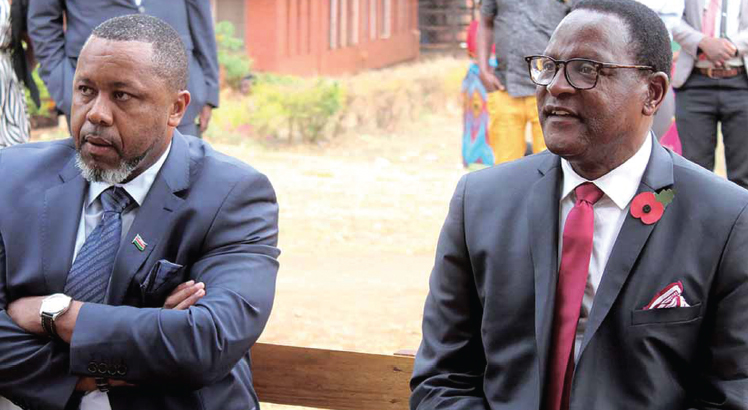Mixed views on immunity
Debate on whether the country should remove presidential immunity from prosecution while in office has drawn mixed views with some backing the status quo and others suggesting doing away with it will boost the graft fight.
The debate has resurfaced after Vice-President Saulos Chilima on July 1 this year publicly asked President Lazarus Chakwera to implement the campaign promise to amend Section 91(2) of the Constitution to do away with the provision that protects the country’s President from criminal prosecution.
Speaking in an interview on Thursday, political analyst Ernest Thindwa said all citizens are equal before the law and if the country is keen to uproot corruption, removing presidential immunity is “a necessary gigantic step”.
He said: “However, Tonse Alliance is particularly challenged to champion the removal of presidential immunity primarily because it was one of the iconic features of the alliance’s electoral platform. So, if the presidential immunity is not removed, it will haunt Tonse Alliance partners in 2025.”

In a separate interview, University of Birmingham Professor of Democracy Nic Cheeseman, who previously served as director of the African Studies Centre, said in a written response that removing the presidential immunity would boost the country’s fight against corruption by giving law enforcement agencies power to hold the Executive to account.
However, he cautioned that it is important to consider the downside of any move.
Said Cheeseman: “Opening up the President to prosecution could embroil the Executive in lengthy and time-consuming processes that take attention away from policymaking, especially if misused by rivals.”
He said despite the possible negative effect that may come with removing the presidential immunity, prosecution was the only way to hold a sitting President to account.
“This is supposed to happen through Parliament, civil society and elections. While Parliament can impeach a President, citizens can vote out one that does not deliver,” Cheeseman said.
He said one of the challenges Malawi faces is that the Legislature has not consistently done an impeachment, as such, the President’s fate can only be decided through the ballot.
But the country’s immediate-past president Peter Mutharika has argued for the preservation of the staus quo.
Speaking on July 17 during a press conference in Mangochi, he said the presidential immunity is good for proper governance of the country by a sitting President.
Mutharika, a professor of international law who was among the framers of the Malawi Constitution in 1994, said Section 91(2) was included in the Constitution to allow the President work without any fear or hindrance.
He said: “The presidential immunity is a function of immunity which enables the presidency to work without any hindrance. This is, in fact, all over the world that the President should not be harmed and should have the freedom to act without fear. I think as a policy, it’s a good policy and also a good idea.
“The idea behind the presidential immunity is to make sure that the President is working without all sorts of complications.”
University of Malawi Professor of Law Garton Kamchedzera on Saturday said there are other laws in the Constitution which provide a way to deal with an offending President.
He said: “Section 86 of the Constitution provides for the indictment, trial and conviction of a President by the National Assembly. Conviction leads to removal and disqualification from the presidency.
“We have not tried impeachment and we assume that prosecution is the most effective way of dealing with an offending President.”
Kamchedzera, who is also a legal and development consultant, said the Constitution already states that serious violation of the supreme law or serious breach of written laws during the term of office of the President can trigger impeachment and other legal proceedings.
Chilima, whose delegated powers were suspended amid allegations of his involvement in corruption, described as an irony the fact that the country’s laws allow for the investigation and prosecution of a serving Vice-President for alleged criminal wrong doing when the same is not extended to the President.
He said: “One of the concrete goals of the Tonse Alliance, which has yet to be attended to, was to remove presidential immunity from criminal prosecution. This promise was pronounced under the campaign agenda of the alliance.”
Presidential press secretary Anthony Kasunda said during the State House Quarterly Briefing on July 4 that Chakwera is currently prioritising review of laws that directly affect Malawians such as land, sedition and other laws.
Meanwhile, Centre for Democracy and Economic Development Initiative and other civil society organisations have demanded that Chakwera should scrap presidential immunity or else he will face street protests.






One Comment